
Stroke is a leading cause of death in the United States and is a major cause of serious disability for adults.
It is also preventable and treatable.
In a study from the University of Auckland, scientists found coordination between the hands may be key to better stroke outcomes.
Stroke is a leading cause of disability in both New Zealand and Australia, impacting almost 40,000 people across the two countries each year.
People use their hands together for most of their daily tasks, but very little is known about how stroke affects the coordination of their hands.
The current research shows that stroke affects some bimanual tasks more than others. The researchers say more detailed studies of bimanual coordination could improve independence in daily activities after stroke.
Stroke most often affects one side of the body, and the weaker hand and arm can become the focus of rehabilitation therapies.
The current study developed a new way to assess how well the hands and arms work together to perform different types of bimanual tasks.
The team examined 56 patients beginning one week after their stroke, until six months afterward.
The study found that tasks involving asymmetric hand movements were more impaired by stroke than those involving symmetric hand movements.
It also found that most recovery of coordination happens in the first three months after stroke, but improvements continued to be seen at six months in some tasks.
The team says this study may offer encouragement for survivors of stroke undergoing rehabilitation in the future.
Most tasks we perform in our lives involve coordinating both hands together, but a lot of therapy after a stroke focuses on one-handed tasks.
A better understanding of how people recover the ability to coordinate their hands could lead to therapies that more effectively improve independence in daily activities.
If you care about stroke, please read studies about what to eat for stroke prevention, and this common painkiller may increase your risk of stroke.
For more information about stroke, please see recent studies about the best high blood pressure treatment for stroke patients, and results showing COVID is not just a respiratory illness, it can cause strokes too.
The study was conducted by Harry Jordan et al and presented at the 31st Annual Scientific Meeting of the Stroke Society of Australasia 2022.
Copyright © 2022 Knowridge Science Report. All rights reserved.



